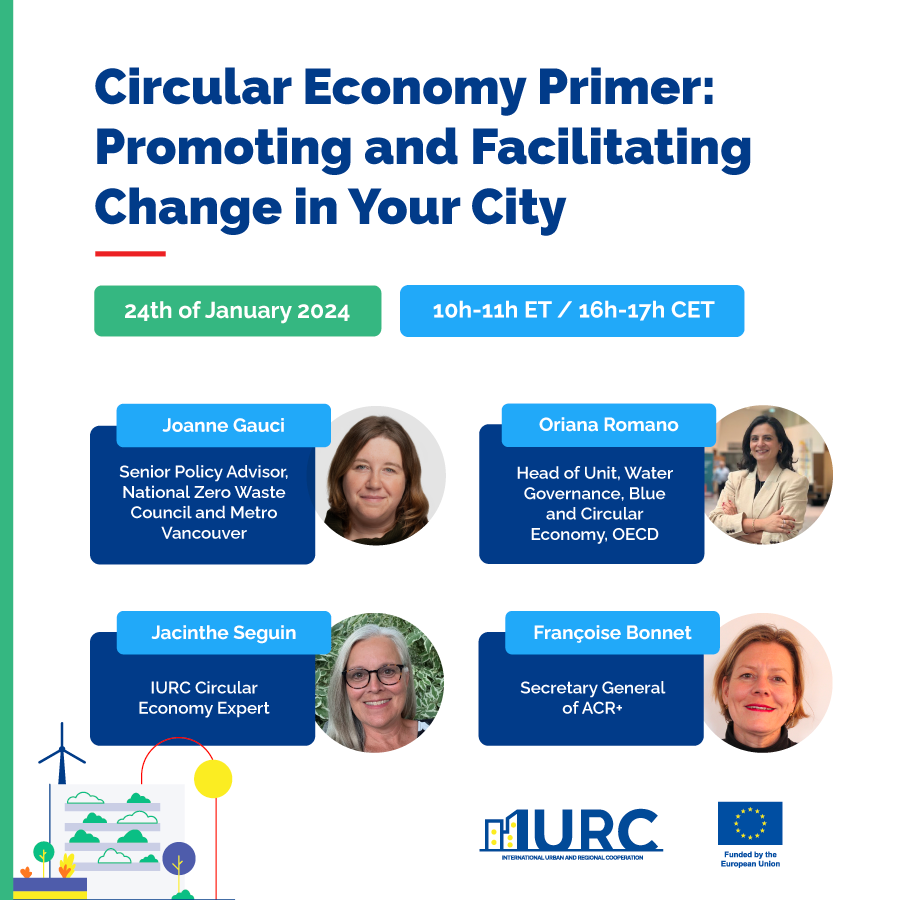January 24th, 2024 – 10 am EST
In the past three years, collaborations, investments, and knowledge sharing has multiplied on themes related to the circular economy (CE). Networks, knowledge-sharing hubs, and training tools are bringing to light the CE innovations and best practices in fields such as waste and water management, land-use planning, transportation, infrastructure and buildings, agriculture, and food systems.
The cities and regions that are part of the IURC NA network are well-placed to contribute to this global transformation to improve circularity by promoting and facilitating change in sectors, services, and governance. As the closest level of governance to citizens and sources of innovation, they can be pioneers in the path towards a circular economy by demonstrating new business models and implementing socio-economic initiatives that will influence the local and regional economy and the health of ecosystems, including climate-oriented solutions.
Through participation in the IURC NA networks, cities have opportunities to further advance knowledge and skills on CE, share experiences, and adapt innovations to make CE more widespread and mainstream. This webinar introduced key organizations and resources at the regional and national levels, as well as hosted a first discussion amongst participants on experiences, interests, and challenges for cities and regions to enable a transformation to a circular economy.
- EU Circular Economy Policy Framework:
- Ana Guallarte and Magdalena Ciesielska emphasized the significance of city-to-city cooperation and thematic networks within the IURC program.
- The Circular Economy Action Plan, part of the EU Green Deal, addresses seven sectors and focuses on regulatory measures while empowering citizens. It aims for climate neutrality, sustainability, and job creation.
- OECD Program on Circular Economy:
- Oriana Romano highlighted the challenges posed by global population growth and urbanization on resource demands.
- The OECD Program on Circular Economy centers on learning, sharing, and measuring, with a focus on tailored policies, exchange of experiences, and indicators for circular economy progress globally.
- Canadian Circular Cities and Regions Initiative (CCRI):
- Joanne Gauci outlined CCRI’s efforts to build circular economy knowledge in Canadian local governments.
- CCRI employs a multifaceted approach, including webinars, peer-to-peer networks, and action planning workshops to inspire, connect, and enable local governments. Progress includes circular economy roadmaps, business development, and regional collaboration.
- ACR+ and Circular Economy Transition:
- Francoise Bonnet discussed ACR+’s 30-year journey supporting the circular economy transition, emphasizing the sufficiency principle and the role of cities and regions.
- ACR+ focuses on providing tools, advocating for decentralized authorities, and connecting stakeholders. The European Circular Economy Stakeholders Platform enhances collaboration through networks and expert access.
- International Cooperation and City Impact:
- International cooperation, governance, and city-level actions are crucial in advancing circular economy principles.
- Circular economy initiatives align with climate change mitigation, job creation, and environmental benefits, emphasizing the interconnectedness of cities and regions in driving sustainability.
